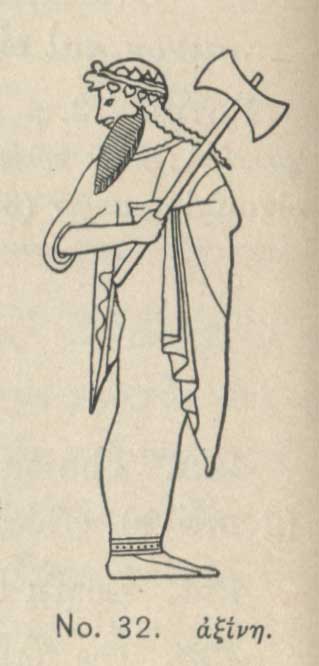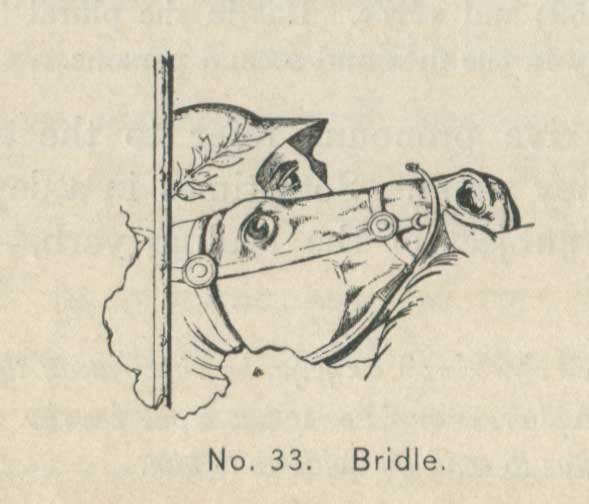THE FIRST GREEK BOOK
BY JOHN WILLIAMS WHITE, PH.D, LL.D., LITT.D.
Professor Of Ancient Greek At Harvard University
This Revision Copyright ©2012 by Shawn Irwin
Lesson XLVII - Personal Pronouns
S433. The personal pronouns are ἐγώ,
I, σύ, you, and οὗ (genitive), of him, of her, of it.
S434. Learn the declension of these three pronouns in 759.
S435. The forms μοῦ, μοί, μέ; σοῦ, σοί, σέ; οὗ, οἷ, ἕ,
are enclitic. But if the pronoun is emphatic, the enclitic forms of the pronoun retain their accent, and in the first person the longer forms
ἐμοῦ, ἐμοί, ἐμέ, are then used. This generally happens also after prepositions.
S436. The nominatives of the personal pronouns are seldom used, except for emphasis. Thus,
μὴ φεύγωμεν, let us not flee, σύ τε γὰρ Ἕλλην εἶ καὶ ἡμεῖς,
for you are a Greek and so are we Greeks.
S437. The pronoun of the third person, οὗ, οἷ, ἕ,
etc., is generally an indirect reflexive in Attic prose, i.e. it is used in a dependent clause to refer to the subject of the leading verb. Thus,
φοβοῦνται μὴ οἱ βάρβαροι σφίσιν οὐχ ἕπωνται,
they fear that the barbarians will not follow them.
S438. To supply the place of a pronoun of the third person the oblique
cases of αὐτός are used. Review 160.
S439. VOCABULARY.
ἀξίνη, ης, ἡ, axe.
δαπανάω, δαπανήσω, etc., spend, expend.
ἐγώ, ἐμοῦ, or μοῦ, pers. pron., I, Latin ego,
stronger form ἔγωγε, I for my part, Latin equidem.
κατασκέπτομαι, etc., view closely.
μά, adverb, by, used in negative oaths.
ξύλον, ου, τό, wood, piece of wood; plur., wood, fuel.
οὗ, dative or, οἱ personal pronoun, of himself, Latin sui.
οὔπω, (οὐ + πώ, yet), adverb, not yet.
προσελαύνω, ride towards or on.
σκέπτομαι, (σκεπ), σκέψομαι, etc., middle deponent, view, spy οut, search.
σύ, σοῦ, personal pronoun, thou, you, Latin tu.
σχίζω, (σχιδ), ἔσχισα, ἐσχίσθην, split.
ὥρᾱ, ᾱς, ἡ, time, season, hour, proper time.

S440.
1. ἀλλ᾽ εἰς ὑμᾶς τοὺς δᾱρεικοὺς ἐδαπάνων.
2. ὁ αὐτὸς στολος ἐστὶν ὑμῖν τε καὶ ἡμῖν.
3. παρὰ τῇ σκηνῇ σου ξύλα ἔσχιζεν ἀξίνῃ ὁ στρατιώτης.
Dative of instrument (866).
4. νομίζω γὰρ ὑμᾶς ἐμοὶ εἶναι φίλους.
5. ἀλλὰ μὰ τοὺς θεοὺς οὐκ ἔγωγε αὐτοὺς διώξω.
The accusative follows the adverb μά in a negative oath (837).
6. ἐμοὶ οὖν οὔπω δοκεῖ ὥρᾱ εἶναι ἡμῖν τοῦτο σκέπτεσθαι.
7. Ξενοφῶν αὐτὸν κελεύει οἱ συμπέμπειν ἀπὸ τοῦ στόματος ἄνδρας.
Observe that this is the dative, and compare 435.
8. ἐγὼ οὖν λέγω ὄτι σὲ δεῖ προσελαύνειν καὶ πάντα κατασκέπτεσθαι.
9. οἱ δὲ στρατηγοὶ αὐτὸν ἐρωτῶσι τί σφίσιν ἔσται ἐὰν νῑκήσωσι.
10. ἀλλ᾽ ἐπεὶ ὑμεῖς ἐμοὶ οὐκ ἐθέλετε πείθεσθαι οὐδὲ ἔπεσθαι, ἐγὼ σὺν ὑμῖν ἕψομαι.
S441.
1. I myself summoned you.
2. He has been wronged by us.
3. This man, fellow-soldiers, is a friend of mine.
I.e. to me.
4. But if I conquer, my friends will be in honor.
5. He feared that his brother would plot against him.
Compare 437.
S442. The Life of Clearchus is in Great Danger.
τῇ δὲ αὐτῇ ἡμέρᾳ Κλέαρχος ἧκεν εἰς τὴν ἀγορὰν τὴν
παρὰ τῷ ποταμῷ. ἐπειδὴ δὲ αὐτὴν κατεσκέψατο, ἀφιππεύει
πάλιν ἐπὶ τὴν ἑαυτοῦ σκηνὴν διὰ τοῦ Μένωνος στρατεύματος
συν ὀλίγοις τοῖς περὶ αὐτόν. Κῦρος δὲ οὔπω ἦκεν, ἀλλ᾽
ἔτι προσήλαυνε˙ τῶν δὲ Μένωνος στρατιωτῶν ξύλα σχίζων τις
Κλέαρχον διελαύνοντα πειρᾶται βάλλειν τῇ ἀξίνῃ˙ ἄλλος δὲ
λίθῳ καὶ ἄλλος, εἶτα πάντες, καὶ κραυγὴ ἦν φοβερά.
ἑαυτοῦ: of himself, his own.
ἄλλος: scilicet. πειπᾶται βάλλειν.

See the route on the map.
End Of Chapter
INDEX
Chapter 48
HOME
This Revision Copyright ©2012 by Shawn Irwin

